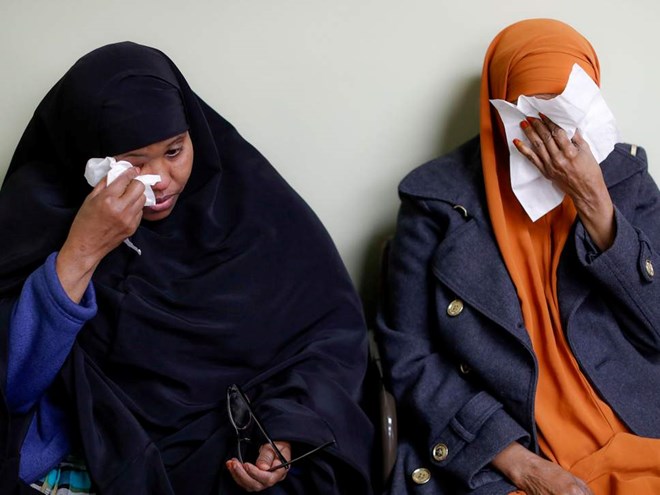
Monday November 5, 2018

Mental health was never a topic that was discussed frequently in my household, or at all.
I
grew up in the Somali diaspora in north London after my family moved to
the UK in 2002 from the Netherlands through secondary immigration.My
mother, like many Somali families, fled the civil war in the Nineties
and was forced to resettle in a foreign land after factional infighting
broke out in Somalia.
It was a brutal war, one that caused many
to see their loved ones murdered before their eyes for simply belonging
to the wrong clan.
Fearing for their lives, people fled on foot and paid smugglers for entry to foreign lands.
Now
in the UK, Somali refugees are forced to grapple with the cultural and
economic battles common to many who are forced to abandon their lives
and seek refuge thousands of miles away from home. But in spite of that
shared pain, in the Somali community, mental health goes largely
unaddressed.
In my early teenage years, I would hear of a lady who lived in our neighbourhood.
My
mother would occasionally check in on her and her children, and bring
them food and provisions where needed. When I would ask what was going
on, my mother would struggle to articulate the situation.
Other
Somali women in our community would lower their voices whenever they
mentioned her and would look almost scared of voicing her “symptoms” as
if mental illness was contagious.
They would religiously bless themselves afterwards and quickly move on to different, lighter topics of conversation.
I
don’t believe these women are to blame for their actions though,
especially given the fact that these are people who have crossed borders
to escape war, dealt with harsh socio-economic conditions in the UK and
are still trying to adopt a new British-Somali identity. In light of
that, it’s somewhat understandable, albeit upsetting, that learning
about mental health may have been slightly neglected.
Language is
a powerful tool and can help shape whole societies and their cultural
norms and practices. In the Somali community, there is a lot of negative
language surrounding mental health. It is not uncommon to be described
as “crazy” and “sick in the head”. Often, the most reported cases of
mental illnesses will be those observed in women.
The slurs also
have a habit of taking a gendered turn, and the woman in question is
often accused of being a “bad Muslim”, who is simply being punished by
Allah for her sins. Other popular rhetoric, at least in my experience,
includes calling people with mental health issues “lazy” and
“attention-seeking”, meaning that in most cases, those suffering from
mental health problems are rarely weaved into the Somali narrative at
all.
My brother dealt with mental health issues for the majority
of my childhood. He made numerous suicide attempts that resulted in him
being cared for solely by our mother for months at a time. When I was
11, he broke both of his legs in one of his attempts to take his life
and moved back into our familial home. My mother was left virtually
isolated as most of the people in the Somali community looked on in pity
and felt largely hopeless. It is only now in my adult years that I
understand there is more that the local authorities could have done, and
could do now to help.
I know there are some organisations looking
to work closely with local mosques to help dispel myths surrounding
mental health, but I can’t help but feel that the Somali community has
been largely untargeted.
I am aware that there are cultural
norms and practises that have survived for generations and I am also
aware of the gravity of the task, but how many more families like my own
need to suffer before we have a collective movement? There have been a
handful of reports, but none of them have done any extensive research
into the Somali community and its relationship with mental health.
The
Somali diaspora in the UK identifies heavily with Islam and, in my
experience, the answer to all mental health questions has been prayer
and tightening your relationship with the deen (religion). A popular
analysis of someone suffering from an illness is that they are possessed
by Jinn (demons) or that they are dealing with Allah’s wrath from their
previous sins.
This is interesting because in Islam, taking care
of one’s health is one of the most important tasks placed upon Muslims.
The hadeeth (teachings of the prophet Muhammed) clearly states that
“Allah brought down the disease and he has also brought down the cure”,
which can be applied to mental health as well as physical health. But
misinterpretation can often lead to a real lack of understanding of the
actualities of mental health within the Somali community, leaving a
large section of its most vulnerable people feeling marginalised and
excluded.
As I’ve said, more outreach programmes specifically
targeted towards the Somali community, workshops held in schools and
even more literature surrounding mental health written in Somali in GPs
would help to tackle this issue moving forward, especially in terms of
educating the older generations on mental health and allowing for
greater communication about these issues. But overall, I believe the
onus lies on the younger generations, including my own, to spearhead
this movement and talk openly about mental health. It only has to start
with a conversation.